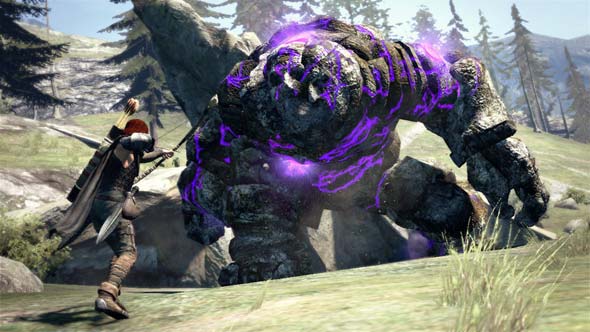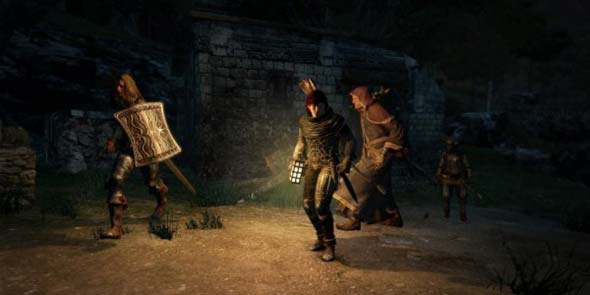The concept of “gamer freedom” and exploration has turned the open-world format into an RPG standard. While large open worlds have always had a place in gaming, the recent years have spawned an ever-growing number of RPGs featuring massive worlds that allow players to make their own adventures and memories, providing a unique experience for every player. However, even though games like Skyrim offer such deep worlds to explore, the push to make them accessible to veterans and newcomers alike has essentially made them all the more limited, taking away traditional stats and complex skill-building in favor of easy-to-play simplistic action with very little reward. Dragon’s Dogma is a rare gem, offering the depth of open-world RPGs with the complexity and challenge of the PC role-playing games of old. It’s not perfect, but it is more than satisfying.
Getting it out of the way, the biggest disappointment in Dragon’s Dogma is its less-than-compelling story. You begin life as simple commoner in the seaside village of Casadeis, but are immediately attacked by an ancient dragon. The dragon, who informs you that you are a chosen one of sorts, proceeds to eat your heart and flee the scene. Luckily, a bit of ancient magic saves you, and you are now tasked to walk the world as the “Arisen” in order to find and slay the evil dragon. There really isn’t much more to it than that, and it feels like the story’s only role is to bring you from one major location to the next, while delivering some cool boss battles along the way.

What the game lacks in story, it makes up for with just about everything else that it has to offer. After creating your character using the surprisingly deep creation tool, you are required to choose a starting “vocation,” which is basically the game’s term for class. You have three options; Fighter, Strider, and Mage. Each of these vocations plays entirely different from one another. The Strider is fast up close, with some quick long-range arrow attacks. The Fighter can handle swords and shields, making it easier to defend yourself. The Mage works with some impressive spells and uses staffs that shoot energy, but casting spells can be slow depending on how long it takes a certain magic attack to charge. When you level up, your character gains bonuses to health, stamina, base attack and defense, and so on, based on your class. However, you also level up your vocation rank separately, earning discipline points to spend on unlocking new skills, or higher-level vocations. There are a total of 9 classes in all, each able to be upgraded individually.
The world of Dragon’s Dogma is absolutely huge, with several dungeons and plenty of beautiful, varied locales so that the scenery is always interesting. There are always clear pathways to your next destination, and a lot can be discovered by following the roads, but straying off the path seems to always lead to an interesting adventure, whether it means finding loot, bandit camps, or hidden caves. However, the game is certainly not easy, and wandering away from the safety of roads can have dire consequences. Enemies don’t scale to your level, meaning that while walking a certain path to the next city may prove to be challenging, heading into the wilderness in search of items can be an absolute nightmare. The presence of enemies increases at night, where the game really takes on that Dark Souls feeling of wandering through the darkness.
When the sun goes down, it becomes very hard to see, so lanterns and oil are a necessity to travel. This makes the game have a sort of “survival horror” aspect to it, as you never know who or what is going to step out of the darkness. Rather than simply waiting around until morning and avoiding the night altogether, Capcom did an excellent job of giving you a good reason to venture into the dark. Some quests can only be found or completed at night, and there are certain plants that can be found only under the moonlight. There are also some very unique enemies to see, like swarms of deadly spirits that possess other enemies, and your party members, to use against you.
The enemies are one of the game’s strong points, featuring interesting twists on classic monsters. Sure, you fight bandits, harpies, a hydra, griffins, cyclops’s and so on, but each is so well-designed that they feel new. The harpies are grotesque winged women, and each cyclops looks different than the last, with broken tusks or rags for clothes. Each of these enemies is deadly as well, and they have their own weaknesses and attacks, forcing you to really put a lot of thought into each battle. Of course, none of this would matter without a great combat system, and Dragon’s Dogma features one of the best.

Designed by developers from Devil May Cry, it comes as no surprise that the combat is very action oriented, but still remains complex enough to appeal to those who like a bit of strategy. One of the most interesting features of the combat is the ability to scale large creatures, in good old fashioned Shadow of the Colossus style, which leads to some truly epic moments. Grabbing onto the back of a Griffin, only to have it soar into the air while you hang on for dear life, attacking its wings to force a landing, is always satisfying. Luckily, you don’t have to fight alone, which is where pawns come into play.
At the start of the game, you create a main pawn and choose his or her vocation. As their level increases, you also have full control over what skills and equipment they should have. Along the way, you’ll also have to travel into “the rift” in order to hire more pawns, and for anyone connected to the internet, the pawns you are able to hire are actually other players’ main pawns. They can help you in a number of different ways other than just in battle. They’ll discover new strategies against enemies, or gain knowledge of how to complete certain quests. You may find that one of the pawns you’ve hired already knows the right way through a dungeon, or how to get to a secret stash of loot. You don’t have full control over these pawns, however, so you are stuck with whatever skills they brought with them. On the other hand, other players are also able to hire your pawn, and every once in a while when you sleep at an inn, your pawn will have “returned” from their journey, though they never left your side. It’s a neat system, and makes for an interesting way to cooperate with other players, even though there is no multiplayer.
As impressive as Dragon’s Dogma is, it’s not without its flaws. While quests are always interesting, the game never really does a good job at telling you where to go. In the very beginning, expect to be completely lost, or perplexed about what you should even be doing in the first place. While the game is focused on exploration, a little bit of direction in the beginning would have been nice. My other complaint is that the inventory screen can be very overwhelming and confusing due to its overly-complex and disorganized set-up. You also can’t equip armor and weapons directly from the inventory, and instead are brought to an entirely different screen for equipment, even though you can clearly see it in the regular inventory. There is also no way set healing items to a particular button, forcing you to open the inventory screen a lot in the middle of combat. While there are no real graphical bugs to speak of on the PlayStation 3 version, the Xbox 360 version seems to suffer from slow-down and glitches, so it’s recommended that you install it to the hard drive if possible. These are some minor complaints, but it can still make the experience frustrating and over-complicated.
Aside from the boring story, and the complete lack of organization in menus, Dragon’s Dogma has a lot going for it. While most people will be turned off by the challenge, with no way to decrease the difficulty, anyone looking for a game that provides a completely fair challenge will be right at home. You feel like a true adventurer on your quest to slay a dragon, where every step is a dangerous one, and every reward feels like a real achievement. Grab your staff, and head out on your journey, because Dragon’s Dogma is easily one of the best RPGs of this generation.


0 Comments